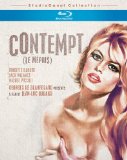| Reviews & Columns |
|
Reviews DVD TV on DVD Blu-ray 4K UHD International DVDs In Theaters Reviews by Studio Video Games Features Collector Series DVDs Easter Egg Database Interviews DVD Talk Radio Feature Articles Columns Anime Talk DVD Savant Horror DVDs The M.O.D. Squad Art House HD Talk Silent DVD
|
DVD Talk Forum |
|
|
| Resources |
|
DVD Price Search Customer Service #'s RCE Info Links |
|
Columns
|
|
|
Contempt -- StudioCanal Collection
Lionsgate Home Entertainment // Unrated // February 16, 2010
List Price: $39.99 [Buy now and save at Amazon]
The Film:
Contempt (Le Mepris) is a challenge, an odd thing for it to be seeing as how it's Jean-Luc Godard's closest attempt at creating mainstream cinema. Conversations are stilted and uncomfortable, the characters rarely appealing, and the relationships developing are clearly headed towards a brick wall; however, that's all the intent of the French auteur's film, as the title suggests. We're wrapped up in the developing scorn between two individuals in a relationship, as well as the blossoming malice between a writer and producer attempting to adapt a classic piece of literature into a film. And, from start to finish, the material is taxing to endless degrees within its irregular brashness, yet not without reward once we've discovered which of the stirring, forlorn entities in the picture we identify with the most.
More specifically, the film is set in Italy, where famed filmmaker Fritz Lang is directing an adaptation of The Odyssey. American producer Jerry Prokosch (Jack Palance) isn't happy with Lang's vision, as he's constructed an arthouse variation of a story that's often told with blossoming action and bombast. As a result, Prokosch has hired a supplemental writer, playwright Paul Javal (Michel Piccoli), to perform a reconstruction on the script to better create a piece of work that's more profitable instead of artistically inclined. Therein lays the first of Contempt's conflicts, pitting Javal, an artist himself, squarely between the creation of a piece of work from a great director and a studio's desire to turn a profit on a picture -- and the banter that ensues between him and the smarmy American producer.
However, it's the layer underneath this that we're more fixated on, being the collapsing marriage between Paul and his stunning wife Camille (Brigitte Bardot). Opening shots in the film indicate a deep sense of affection between the two, as Paul compliments each of Camille's nude body parts as a gesture of reassurance, but her mood quickly changes after she spends an afternoon with the flamboyant Prokosch. Contempt wryly fixates on a lengthy back-and-for between the married couple at the center of the film, where their relationship begins to show rickety leaks like cracks in an aging boat. Within that, we're bearing witness to a growing sense of revulsion building between them, one that mirrors a collage of many of the statements heard during the crumble of a marriage between two loving people with differing outlooks. They discuss sex and affection, but it's more of a dance around a fact they're both fully aware of -- the reasoning behind Camille's muted, saddened disposition around her husband.
As compelling as it is to watch, Contempt is also tough to swallow down. Our locations rarely shift, staying within the confines of the desolate yet striking white apartment for the larger part of the picture, while banter about the fabric of interwoven relationships -- oftentimes double-translated through several languages -- becomes the sole focus. Godard wants us to parallel the conflicts between the characters to The Odyssey, to a degree, illustrating the comparison between barreling through a relationship to that of a tragic journey rife with stumbling blocks that shape a person's disposition. He succeeds, but not in creating a pleasurable film; watching Camille's rash shifts in manner, and paying attention to Paul's prying reactions to her changes, are discomforting. However, the natural performances are gripping enough from both actors to hold our prickly focus, especially from the wide-eyed Brigitte Bardot as a pained wife with a not-so-hush-hush secret.
Paul's banter with the American producer constructs an equally demanding dynamic, both between them and with Camille in the mix. Jack Palance does a great job at creating a Hollywood glitzy producer archetype that's disagreeable yet charming, a style of character that's turned into a bit of a cartoon figure with subsequent films. Their disagreement illustrates the state of cinema at the time as well, with Palance's arrogant producer as a representation of the business-minded state of cinema usurping the arty segment of filmmaking. They sit down to watch a screening of the picture with director Fritz Lang in a somewhat stale, melancholy screening room, and -- though vexed by the lead actress' nude figure -- Prokosch stirs around in the room and clamors about it deviating from the script. It's a moment where we witness the rebirth of a slain piece of art into something commercial by the person controlling the cash flow, something that mirrors a conflict behind the scenes of Godard's film itself regarding the presence of Bardot's nude form in the film.
Though Contempt is a stiff projection of relationships, Godard makes certain to retain his sense of free-form, abstract beauty as well. He makes usage of iconic images of Greek statues to break from the film's rigid atmosphere, using silky blues and expansive oceanside vistas to paint a beautiful image of the work Fritz Lang would've created with Homer's story. These images accomplish exactly what they're supposed to do: make us ponder about what this version of The Odyssey would've been like, one that emphasizes artistic integrity and poeticism instead of moneybag-driven whims. That's a lingering thought as we're witnessing the battle over the content, adding to the overall themes revolving around the defeat of integrity and giving in to a situation. In a way, these images are sad as well, mostly because of the fact that they're ghosts of a creation that'd never happen -- which also tie to the ghosts of a grand relationship crumbling before our eyes with Paul and Camille.
Because of all this, and because of the presence of Brigitte Bardot, Contempt also exists as Godard's most expensive picture, a "larger"-budget foray into explorative art that's as salacious as its title. We're literally witnessing "contempt" manifest on-screen, which isn't exactly the most pleasant of things to delve into within a piece of cinema. The scary thing about it might come at the moment when a line of dialogue sounds eerily similar to something you've said in a conversation with a significant other, ranging from the scant high points where Paul and Camille are civil to the even more frightening lows when they're passive-aggressively clamoring at each other's throats. This isn't so much a production about the destruction of something beautiful, but the demise of an assortment of things due to whims and ideals not lining up the way they should. Godard's picture is tough and very calculated, but it's magnetic because of what it says during its deliberate drudge with the audience.
The Blu-ray:
Lionsgate's presentation of the StudioCanal Series differ a bit from the versions found in other locations, opting away from the Blu-ray books for the more standard-size packaging. Each one comes with a matte cardboard slipcover, not shiny, that retains the same artwork found in other locations, while a nice-sized booklet with textual information can be found inside each case. Once the disc is fired up, a wide range of countries can be selected -- Australia, Danmark, Deutschland, Espana, France, Nederland, Norge, Suomi, Sverige, United Kingdom, US, and China -- that tailor to the menu design. Each of the StudioCanal discs have the same aesthetic framework for their Blu-ray menus, containing the same music and coloring for each.
Video and Audio:
Contempt's 2.35:1 1080p AVC encode, handled by StudioCanal and distributed to its many outlets, is a largely successful affair in translating this film properly to high-definition. Most notably, detail has been tightened to a great degree, emphasizing texture in the Grecian statues and the exterior locales to pleasing degrees -- if a bit on the soft side. The color timing differs some from the standard-definition Criterion release, holding a much more balanced palette (check out the control held over red saturation throughout) and a brighter overall look to the print. Fine elements, like Bardot's close-ups when bathed in sunlight and the look of shadows in daytime interior shots, are handled to very appropriate levels. There are a few caveats; the first existing in the contrast levels which, though benefiting the brightness of the picture, causes a few of the black levels to appear a shade lighter than expected. Attempts to control some of the more difficult black levels make some of the grain stand out a bit, while other black levels swallow detail up completely. And, though gorgeous, there are a few instances where a few minor blips and print speckles can be seen. These are all nitpicks on a mostly pleasing rendering of Godard's picture, one that presents a very film-like experience.
Audio finds a clear upgrade to a DTS HD Master Audio track, mixing the myriad of languages in 2.0 Stereo sound (mono stretched a bit to two-channel output) -- which is what the receiver picks the track up as, instead of as a "Master Audio" varietal. Clarity has been greatly improved, projecting vocals to a natural high and mid-range level against the sound design. The musical accompaniment also fluctuates against the track better than expected, hitting crescendos with quite a few surprising mid-range bass motions. There is very little low-end activity, however, only teased at by the music and the rumbling of Prokosch's bright red Alfa-Romeo 2600. The language does, naturally, show its age and budget-minded weakness, which reflect in a slightly metallic and thin-sounding disposition, but a heightened level of clarity takes it a step above its standard-definition counterpart. Subtitles are extremely pleasing, in white lettering that appears within the image itself, and are available in all the languages mentioned at the beginning of the disc.
Special Features:
Once Upon a Time There Was ... Contempt (52:28, SD MPEG-2):
This nearly hour-long piece covers the history behind Contempt, told through interview time and snippets involving Godard. He dives into the French New Wave a bit, discussing the production history of his other films, and how he came about tackling a more "Classical" adaptation of Contempt. Some really great archive footage of Fritz Lang can be found in the mix as the story's being told, while film philosophers give their interpretations of the history behind the film's construction. It's a dense recollection of the film's creation, one that's enhanced by the many snippets of footage behind-the-scenes -- such as the shot of paparazzi being shewed away from the set.
Contempt .. Tenderly (31:31, SD MPEG-2):
Here, we dive a bit more into the adaptation of Contempt from the origin novel, as well as the parallels between the ancient and modern worlds. Discussion about maintaining the balance, both with the actors and with the location photography, are covered extensively through interviews with Aiain Bergala and others attached to the film. This lengthy piece doesn't intersect to any great degrees with the orevious one, making them both worthwhile watching experiences back-to-back.
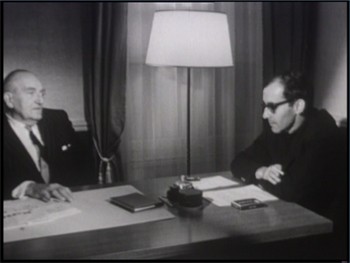 The Dinosaur and the Baby (1:00:57, SD MPEG-2):
The Dinosaur and the Baby (1:00:57, SD MPEG-2):
The archive footage mentioned above regarding Fritz Lang is taken from this compelling, lengthy piece from 1967, which takes both he and Godard and focuses on conversations between them -- with scenes from the film, and other works, intermingled within their talks about art and cinema. The piece is older, in black and white and framed at 4x3, and contains proper English subtitles. Lang discusses his passion for film as a broad medium for a wide audience, which makes the whole expanse worthwhile in itself.
Conversation with Fritz Lang (14:27, SD MPEG-2):
A second archive interview with Fritz Lang is also included here, a documentary-like portrait of the director that again features footage from Contempt as a backdrop. It finds him on-set on "The Odyssey" talking about the production, with footage from his other films also incorporated -- as well as a humorous interruption in the middle from tourists wanting a glimpse at Brigitte Bardot.
Rounding things out for this Blu-ray, we've got the somewhat famous Trailer 2:31, SD MPEG-2) that features the large block text and cast members calling out the words as they form on-screen. Also, an optional Introduction by Colin McCabe is available to screen before the film, giving tidbits about the history and such.
Final Thoughts:
Contempt gives us a compelling glimpse into torn relationships, both within the fabric of marriage and in the profession filmmaking arena, and how the integrity of individuals can be molded with time and pressure. It's a gorgeous film on the surface, shot with lurid color clearly in the director's focus, yet the rigidity of the dialogue -- and the way in which the relationships are handled -- craft a difficult film out of its artistically-inclinded elements. Lionsgate's offering of this StudioCanal Collection package offers strong aural/visual elements and a handful of dense, worthy features, thus earning this Blu-ray disc a High Recommendation for the content and the experience that the disc offers in screening this challenging yet magnetic picture.
Note: Screenshots from this review are from the standard-definition release of Contempt, and do not reflect the quality of this Blu-ray disc.
Thomas Spurlin, Staff Reviewer -- DVDTalk Reviews | Personal Blog/Site
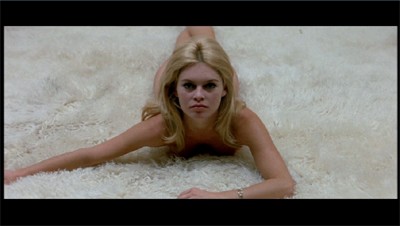 |
More specifically, the film is set in Italy, where famed filmmaker Fritz Lang is directing an adaptation of The Odyssey. American producer Jerry Prokosch (Jack Palance) isn't happy with Lang's vision, as he's constructed an arthouse variation of a story that's often told with blossoming action and bombast. As a result, Prokosch has hired a supplemental writer, playwright Paul Javal (Michel Piccoli), to perform a reconstruction on the script to better create a piece of work that's more profitable instead of artistically inclined. Therein lays the first of Contempt's conflicts, pitting Javal, an artist himself, squarely between the creation of a piece of work from a great director and a studio's desire to turn a profit on a picture -- and the banter that ensues between him and the smarmy American producer.
However, it's the layer underneath this that we're more fixated on, being the collapsing marriage between Paul and his stunning wife Camille (Brigitte Bardot). Opening shots in the film indicate a deep sense of affection between the two, as Paul compliments each of Camille's nude body parts as a gesture of reassurance, but her mood quickly changes after she spends an afternoon with the flamboyant Prokosch. Contempt wryly fixates on a lengthy back-and-for between the married couple at the center of the film, where their relationship begins to show rickety leaks like cracks in an aging boat. Within that, we're bearing witness to a growing sense of revulsion building between them, one that mirrors a collage of many of the statements heard during the crumble of a marriage between two loving people with differing outlooks. They discuss sex and affection, but it's more of a dance around a fact they're both fully aware of -- the reasoning behind Camille's muted, saddened disposition around her husband.
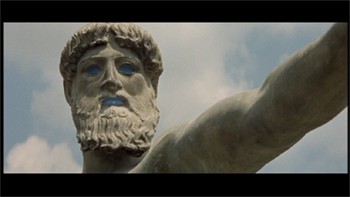 | 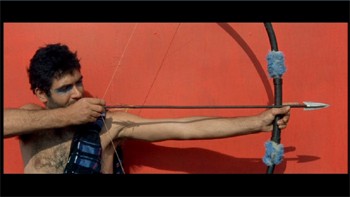 |
As compelling as it is to watch, Contempt is also tough to swallow down. Our locations rarely shift, staying within the confines of the desolate yet striking white apartment for the larger part of the picture, while banter about the fabric of interwoven relationships -- oftentimes double-translated through several languages -- becomes the sole focus. Godard wants us to parallel the conflicts between the characters to The Odyssey, to a degree, illustrating the comparison between barreling through a relationship to that of a tragic journey rife with stumbling blocks that shape a person's disposition. He succeeds, but not in creating a pleasurable film; watching Camille's rash shifts in manner, and paying attention to Paul's prying reactions to her changes, are discomforting. However, the natural performances are gripping enough from both actors to hold our prickly focus, especially from the wide-eyed Brigitte Bardot as a pained wife with a not-so-hush-hush secret.
Paul's banter with the American producer constructs an equally demanding dynamic, both between them and with Camille in the mix. Jack Palance does a great job at creating a Hollywood glitzy producer archetype that's disagreeable yet charming, a style of character that's turned into a bit of a cartoon figure with subsequent films. Their disagreement illustrates the state of cinema at the time as well, with Palance's arrogant producer as a representation of the business-minded state of cinema usurping the arty segment of filmmaking. They sit down to watch a screening of the picture with director Fritz Lang in a somewhat stale, melancholy screening room, and -- though vexed by the lead actress' nude figure -- Prokosch stirs around in the room and clamors about it deviating from the script. It's a moment where we witness the rebirth of a slain piece of art into something commercial by the person controlling the cash flow, something that mirrors a conflict behind the scenes of Godard's film itself regarding the presence of Bardot's nude form in the film.
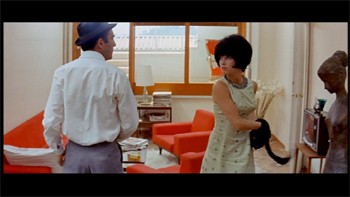 | 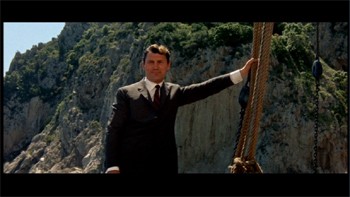 |
Though Contempt is a stiff projection of relationships, Godard makes certain to retain his sense of free-form, abstract beauty as well. He makes usage of iconic images of Greek statues to break from the film's rigid atmosphere, using silky blues and expansive oceanside vistas to paint a beautiful image of the work Fritz Lang would've created with Homer's story. These images accomplish exactly what they're supposed to do: make us ponder about what this version of The Odyssey would've been like, one that emphasizes artistic integrity and poeticism instead of moneybag-driven whims. That's a lingering thought as we're witnessing the battle over the content, adding to the overall themes revolving around the defeat of integrity and giving in to a situation. In a way, these images are sad as well, mostly because of the fact that they're ghosts of a creation that'd never happen -- which also tie to the ghosts of a grand relationship crumbling before our eyes with Paul and Camille.
Because of all this, and because of the presence of Brigitte Bardot, Contempt also exists as Godard's most expensive picture, a "larger"-budget foray into explorative art that's as salacious as its title. We're literally witnessing "contempt" manifest on-screen, which isn't exactly the most pleasant of things to delve into within a piece of cinema. The scary thing about it might come at the moment when a line of dialogue sounds eerily similar to something you've said in a conversation with a significant other, ranging from the scant high points where Paul and Camille are civil to the even more frightening lows when they're passive-aggressively clamoring at each other's throats. This isn't so much a production about the destruction of something beautiful, but the demise of an assortment of things due to whims and ideals not lining up the way they should. Godard's picture is tough and very calculated, but it's magnetic because of what it says during its deliberate drudge with the audience.
The Blu-ray:
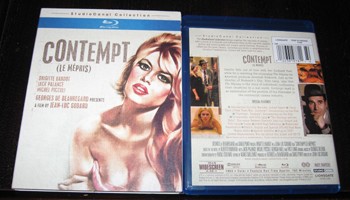 | 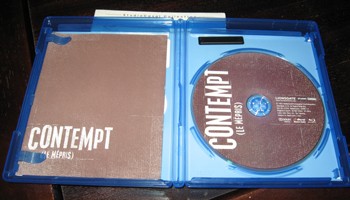 |
Lionsgate's presentation of the StudioCanal Series differ a bit from the versions found in other locations, opting away from the Blu-ray books for the more standard-size packaging. Each one comes with a matte cardboard slipcover, not shiny, that retains the same artwork found in other locations, while a nice-sized booklet with textual information can be found inside each case. Once the disc is fired up, a wide range of countries can be selected -- Australia, Danmark, Deutschland, Espana, France, Nederland, Norge, Suomi, Sverige, United Kingdom, US, and China -- that tailor to the menu design. Each of the StudioCanal discs have the same aesthetic framework for their Blu-ray menus, containing the same music and coloring for each.
Video and Audio:
Contempt's 2.35:1 1080p AVC encode, handled by StudioCanal and distributed to its many outlets, is a largely successful affair in translating this film properly to high-definition. Most notably, detail has been tightened to a great degree, emphasizing texture in the Grecian statues and the exterior locales to pleasing degrees -- if a bit on the soft side. The color timing differs some from the standard-definition Criterion release, holding a much more balanced palette (check out the control held over red saturation throughout) and a brighter overall look to the print. Fine elements, like Bardot's close-ups when bathed in sunlight and the look of shadows in daytime interior shots, are handled to very appropriate levels. There are a few caveats; the first existing in the contrast levels which, though benefiting the brightness of the picture, causes a few of the black levels to appear a shade lighter than expected. Attempts to control some of the more difficult black levels make some of the grain stand out a bit, while other black levels swallow detail up completely. And, though gorgeous, there are a few instances where a few minor blips and print speckles can be seen. These are all nitpicks on a mostly pleasing rendering of Godard's picture, one that presents a very film-like experience.
Audio finds a clear upgrade to a DTS HD Master Audio track, mixing the myriad of languages in 2.0 Stereo sound (mono stretched a bit to two-channel output) -- which is what the receiver picks the track up as, instead of as a "Master Audio" varietal. Clarity has been greatly improved, projecting vocals to a natural high and mid-range level against the sound design. The musical accompaniment also fluctuates against the track better than expected, hitting crescendos with quite a few surprising mid-range bass motions. There is very little low-end activity, however, only teased at by the music and the rumbling of Prokosch's bright red Alfa-Romeo 2600. The language does, naturally, show its age and budget-minded weakness, which reflect in a slightly metallic and thin-sounding disposition, but a heightened level of clarity takes it a step above its standard-definition counterpart. Subtitles are extremely pleasing, in white lettering that appears within the image itself, and are available in all the languages mentioned at the beginning of the disc.
Special Features:
Once Upon a Time There Was ... Contempt (52:28, SD MPEG-2):
This nearly hour-long piece covers the history behind Contempt, told through interview time and snippets involving Godard. He dives into the French New Wave a bit, discussing the production history of his other films, and how he came about tackling a more "Classical" adaptation of Contempt. Some really great archive footage of Fritz Lang can be found in the mix as the story's being told, while film philosophers give their interpretations of the history behind the film's construction. It's a dense recollection of the film's creation, one that's enhanced by the many snippets of footage behind-the-scenes -- such as the shot of paparazzi being shewed away from the set.
Contempt .. Tenderly (31:31, SD MPEG-2):
Here, we dive a bit more into the adaptation of Contempt from the origin novel, as well as the parallels between the ancient and modern worlds. Discussion about maintaining the balance, both with the actors and with the location photography, are covered extensively through interviews with Aiain Bergala and others attached to the film. This lengthy piece doesn't intersect to any great degrees with the orevious one, making them both worthwhile watching experiences back-to-back.
 The Dinosaur and the Baby (1:00:57, SD MPEG-2):
The Dinosaur and the Baby (1:00:57, SD MPEG-2): The archive footage mentioned above regarding Fritz Lang is taken from this compelling, lengthy piece from 1967, which takes both he and Godard and focuses on conversations between them -- with scenes from the film, and other works, intermingled within their talks about art and cinema. The piece is older, in black and white and framed at 4x3, and contains proper English subtitles. Lang discusses his passion for film as a broad medium for a wide audience, which makes the whole expanse worthwhile in itself.
Conversation with Fritz Lang (14:27, SD MPEG-2):
A second archive interview with Fritz Lang is also included here, a documentary-like portrait of the director that again features footage from Contempt as a backdrop. It finds him on-set on "The Odyssey" talking about the production, with footage from his other films also incorporated -- as well as a humorous interruption in the middle from tourists wanting a glimpse at Brigitte Bardot.
Rounding things out for this Blu-ray, we've got the somewhat famous Trailer 2:31, SD MPEG-2) that features the large block text and cast members calling out the words as they form on-screen. Also, an optional Introduction by Colin McCabe is available to screen before the film, giving tidbits about the history and such.
Final Thoughts:
Contempt gives us a compelling glimpse into torn relationships, both within the fabric of marriage and in the profession filmmaking arena, and how the integrity of individuals can be molded with time and pressure. It's a gorgeous film on the surface, shot with lurid color clearly in the director's focus, yet the rigidity of the dialogue -- and the way in which the relationships are handled -- craft a difficult film out of its artistically-inclinded elements. Lionsgate's offering of this StudioCanal Collection package offers strong aural/visual elements and a handful of dense, worthy features, thus earning this Blu-ray disc a High Recommendation for the content and the experience that the disc offers in screening this challenging yet magnetic picture.
|
| Popular Reviews |
| Sponsored Links |
|
|
| Sponsored Links |
|
|
| Release List | Reviews | Shop | Newsletter | Forum | DVD Giveaways | Blu-Ray | Advertise |
|
Copyright 2024 DVDTalk.com All Rights Reserved. Legal Info, Privacy Policy, Terms of Use,
Manage Preferences,
Your Privacy Choices | |||||||









